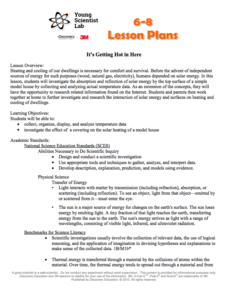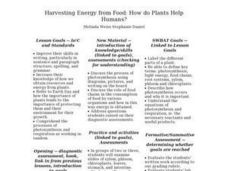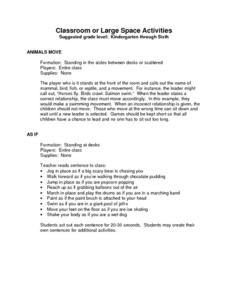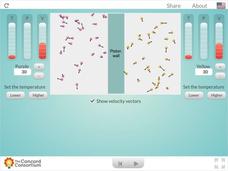Curated OER
Work and Energy
Learners show that energy is conserved in the laboratory. They calculate the work done by a force on an object as the product of the force and a displacement of the object from a reference point.
Curated OER
Gravitational Potential Energy
In this energy worksheet, high schoolers use the gravitational potential energy equation to solve for mass, height, or free-fall acceleration. This worksheet has 10 problems to solve.
Curated OER
Activity #15 What Happens To A Liquid As Energy Is Added?
Learners model the arrangement of particles in a liquid. They use the model, to demonstrate how a gas is formed from a liquid with no increase in temperature as energy is added. Pupils model the arrangement and movement of gas particles.
Curated OER
Heat and Electrical Resistance
Learners discover electrical resistance and how it is directly related to thermal energy through a hands-on activity. Working in groups, they wrap a wire around a thermometer and the positive and negative poles of a D cell battery and...
Curated OER
Its Electric!
Fourth graders define the differences between static and current electricity by participating in an investigation. In this energy lesson, 4th graders utilize electrical supplies to demonstrate the differences between static and...
Curated OER
Elementary Article: What's a Short Circuit?
Students read an article about short circuits. In this science reading comprehension lesson plan, students read about short circuits and study the diagram to learn more about electricity and energy.
Curated OER
As the Rotor Turns: Wind Power and You
Students get acquainted with the basics of wind energy. In this engineering lesson students describe how wind is generated, analyze the transformations of energy, and demonstrate how electricity is generated using wind power.
Teach Engineering
Thrown for a Loop
Round and round it goes. Class members observe a current carrying loop in a magnetic field and calculate its associated torque. They then apply what they have learned to example problems to solve for the torque and to calculate the...
Peaceful Playgrounds, Inc.
10 Rainy and Snow Day Activities for Indoor Recess and PE
Don't let the rain and snow put a damper on your PE lessons. This collection of indoor activities is a perfect way to keep students active regardless of the weather outside.
Polar Trec
Calorimetry Lab
Young people between the ages of 11–13 need on average about 2,000 calories per day. Within the lab, groups learn about calorimetry and respiration. They explore how it pertains to humans and animals living the Arctic where cold...
Discovery Education
It's Getting Hot in Here
Class members engage in a STEM experiment and investigate how materials affect heating in a house by creating models of houses and using different top surface materials. They record the temperature inside the models and consider what the...
Teach Engineering
Quantum Dots and Colors
Introduce teams to quantum dot solutions with an activity that has them expose solutions to a blacklight, observe the colors, and take measurements. Groups graph the data and analyze the dependence between particle size and...
Curated OER
Harvesting Energy from Food: How do Plants Help Humans?
Beginning botanists view slides of plant vascular tissue. They watch Magic School Bus Gets Planted, which you can find online, and then write a summary of what they have learned about plants. This instructional activity could be used...
Curated OER
Nuclear Chemistry Project
Radiation has numerous real-world applications, some of which are relatively safe while others can be extremely hazardous. In this nuclear chemistry project, young scientists choose a practical use of nuclear reactions to...
It's About Time
What Drives the Plates?
It's getting hot in here! Lead your emerging geoscientists on a thrilling journey as they calculate liquid densities to determine forces that stimulate thermal plates from within the earth's crust. They explore effects of temperature on...
College Board
2008 AP® Environmental Science Free-Response Questions
Some of the oiliest creatures on earth may be the answer to our energy crisis! Using a four-question assessment, resource scholars consider the use of microalgae as fuel among other environmental science topics. Each question has several...
Purdue University
Sun Tracking System for a Solar Panel
Capture the Sun's rays as best as possible. An engaging STEM lesson teaches scholars about how Earth's tilt causes the path of the sun to change throughout the year. They create solar panel systems that move both horizontally and...
Baylor College
Pre-Assessment: Earth's Energy Sources
A ten-question, multiple-choice quiz assesses what your elementary earth scientists know about the atmosphere both before and after a unique unit on global atmospheric change. Make sure to check out the activities and lesson plans...
San Joaquin Valley Air Pollution Control District
Classroom or Large Space Activities
The 24 activities detailed in this packet are designed to get kids up and moving with a minimum of chaos. A great resource to have on hand for drama classes and content courses.
NOAA
Ocean Exploration
Sea explorers and scientists have found that because of temperatures being two to three degrees Celsius at the bottom of the ocean, most animals are lethargic in order to conserve energy. In this web quest, pairs of learners read about...
NOAA
Community Ecology and Sampling
Seamounts in the Coral and Tasman Seas are home to more than 850 different species. Groups explore hydrothermal vents, researching the organisms found there and their energy source. They also learn about seamounts, exploring their unique...
Columbus City Schools
History Helps When It Comes To Plate Tectonics
Get ready to move, shake, slip, and slide with a well-rounded plate tectonics unit! The engaging resource includes everything you need to inspire eighth grade science scholars, from worksheets to demonstrations. Assess their...
Concord Consortium
The Temperature-Volume Relationship
What effect does temperature have on the volume of a gas? Observe the temperature-volume relationship through an animated simulation. The user controls the temperature, and a moveable piston reacts to increased or decreased thermal...
Concord Consortium
Pressure Equilibrium
All together now! Physical science pupils observe the effects of temperature and amount of substance on pressure and volume of a gas. The interactive resource guides learners through the Combined Gas Law, where they observe changing...

























